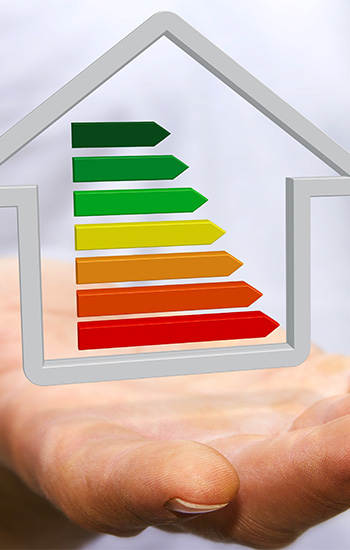Landlords need to adhere to specific guidelines set by the Minimum Energy Efficiency Standards (MEES) in order to comply and let their properties to tenants.
As the MEES tighten rules and regulations on energy efficiency, as a landlord you will need to comply, otherwise you may be on the end of a heft fine of up to £5,000.
Homes with better energy efficiency release less carbon into the atmosphere, become more sought-after properties and help lower energy bills for tenants.
Avoid being fined
EPC Rating
Minimum of C by 2025

In order to get the desired EPC rating set by the MEES, landlords can invest in a series of insulation services and renewable energy installations that can make a home a lot more energy efficient.
Installing quality insulation in your roof is one of the most effective methods to improve your property’s EPC rating. As heat rises, your roof area becomes an easy escape for energy, negatively affecting your home’s energy efficiency.
Our professionals recommend either warm or cold loft insulation to reduce heat loss and improve energy efficiency.
Insulating your roof presents a few different options, whether you use blown-in insulation, or batts and rolls, this area can be accomplished on your budget and timeframe.
Cavity wall insulation is another key area of your property that should be insulated to improve your home’s EPC rating. Without either roof or cavity wall insulation, it can be nearly impossible to achieve a greater EPC rating than E.
Cavity walls, if uninsulated, allow for up to 33% of heat to escape, therefore, by insulating these areas with products such as EPS beads, you can effectively reduce heat loss and become energy-efficient.
As a landlord, the better your property’s energy rating the more desirable your home is to be rented out. Therefore, by improving your EPC rating, you will likely see many additional benefits.
In order to get your property’s EPC rating to the minimum required E-rating, floor insulation can help get you there.
If you’ve already invested in insulating your roof space and cavity walls, but you are still not at an E, then you should consider insulating your floors.
This area of a home can help reduce energy wastage, making your property more efficient and improving your EPC score.
The three main areas for insulation are your roof, cavity wall and floor, if the first two do not succeed (although they should), then it is time to look at insulating the floors.
Insulation is not the only solution to improve your property’s EPC rating. Other methods are installing renewable energy solutions, such as solar panels.
Solar panels create a renewable source of energy for your home and release no carbon into the atmosphere, making them a clean source of energy.
Another renewable source of green energy to help improve your EPC rating is heat pumps.
Heat pumps can use the energy from outside and take it into your home, through radiators and other areas, and sustainable heat your property.
Installing heat pumps is also beneficial for the summer months because they can extract colder air and emit it into your home.
Due to this renewable source of energy, as a landlord you can meet and exceed the EPC rating required and stay compliant.

As the MEES has set a minimum of an E rating for a home’s EPC to be rented out, there are some exemptions to help landlords in more specific situations.
If the cost to improve your home's insulation exceeds £3,500 (the price cap of these measures) then you may be entitled to a 5 year exemption.
If any insulation to your walls or cavity walls will negatively impact the fabric or structure of the property, you may be entitled to a 5 year exemption
If your property will be devalued by over 5% due to the insulation installation then you may be entitled to receiving a 5 year exemption.
If you need consent to enforce any insulation changes to improve your EPC rating from a 3rd party and they refuse to give it, you may be exempt.
As a landlord, you need to be conscious of your property’s EPC rating in order to legally let.
You can request an EPC directly through us which will provide a detailed document of possible improvements, along with your rating and other key details.
As a landlord, you can find out all the possible information for complying with MEES and conditions your property must meet via the UK gov website here.
It is always a good idea to get the highest possible EPC rating you can get, as this means your property will be the most energy efficient, saving money on bills and be more desirable for tenants.
But by law, you need at least a rating of an E (according to current times 2023) however, by 2025, new builds will be required to have an EPC rating of a C.
You should have a valid EPC before you rent out your property, if not, you may be penalised.
If you do not have a document that outlines your EPC rating then you can contact us directly to get one.
Once you have attained your EPC rating and document, this will then last for a period of 10 years, before having to renew it again.
Currently, your EPC rating can range from A-G, with A being the most energy efficient and G being the least.